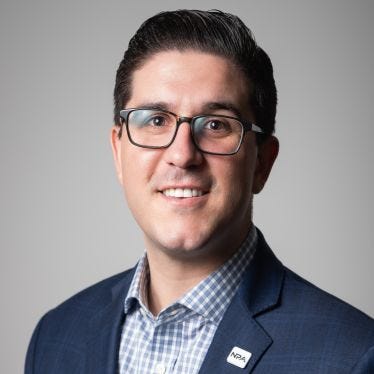Kyle Turk of the Natural Products Association breaks down the status of legislation in states across the U.S. that would restrict access to dietary supplements, as well as what's at stake politically in the upcoming state and federal elections.

This is part of Natural Products Insider’s periodic updates from trade associations and other major stakeholders. These are meant to keep industry readers updated on these organizations’ activities and priorities, as well as to issue calls for action. These are op-ed commentaries and represent the views from the authors and/or the organizations they represent, not necessarily the views of Natural Products Insider or its editorial staff.
As we pass the mid-year mark, it’s essential to reflect on the first half of the year and examine our industry’s status. First, the Natural Products Association (NPA) has led the legislative fight against the misguided and ill-advised supporters of mandatory product listing at the federal level.
NPA is also leading the fight against a growth of radical proposals in state legislatures that would restrict access to supplements. NPA remains the only trade organization opposed to these proposals, using every opportunity available to meet with legislators and their staffs, testify before committees and build a grassroots network with thousands of supporters who have written their state lawmakers urging their opposition to these proposals.
While Washington typically attracts the most attention regarding policymaking, it’s imperative to recognize state governments’ role in our industry. Having worked with state legislatures throughout my career, I can say this is becoming a much more important arena as Congress is increasingly deadlocked due to thin majorities.
One of NPA’s state policy objectives is that dietary supplements be exempted from state sales tax. We have achieved that status in seventeen states and the District of Columbia, and we are proud to announce that we won our most recent victory on this issue in Kansas. One other notable state achievement was in New Jersey, where the state Senate has proposed to recognize every July 9th as Creatine Day.
While these are positive developments, the majority of our state work focuses on blocking dangerous and costly proposals that would restrict, reduce or eliminate access to supplements. Although a significant portion of Americans take at least one dietary supplement as a safe, effective and affordable way to maintain good health and augment diets, several state legislatures are considering such measures, which is of deep concern to us at NPA and part of a growing trend.
The dietary supplement industry should be especially alarmed that these proposals continue to advance through legislatures despite the facts and public opinion being in our favor.
California, New York, New Jersey, Massachusetts, Missouri and Rhode Island legislators continue to ignore both their constituents who have sent thousands of emails and the science of dietary supplements while peddling a disinformation campaign against the industry. For example, there is not a single data point or signal from FDA—the chief regulator of nutritional supplements—indicating a correlation between the use of dietary supplements and eating disorders. Yet, state lawmakers routinely make this false claim. NPA has gone to the extraordinary step of filing FOIA (Freedom of Information Act) requests with FDA twice to explore this question. In both instances, FDA found no correlation between eating disorders and the use of dietary supplements.
Unfortunately, some have argued adverse event reports (AERs) aren’t sufficient to determine a temporal relationship between a product and an eating disorder. This couldn’t be further from the truth because FDA uses the MedWatch system to add warnings to products it regulates that lead to or exacerbate eating disorders. If supplements truly lead to eating disorders, MedWatch is perfectly designed to detect it. It has not found such a problem.
Additionally, supporters of these proposals fail to understand the importance of the medical testing protocol, challenge–dechallenge–rechallenge (CDR) in determining adverse event causality relative to an ingested product. CDR is a medical testing protocol in which a product is administered, withdrawn, then re-administered while being monitored for adverse effects at each stage.
CDR is used when statistical testing is inappropriate due to an idiosyncratic reaction by a specific individual—which is very common with eating disorders.
The stakes are high for our industry in November’s election, and it’s never been more critical for us to continue building our political advocacy. Whether through supporting candidates who are industry champions like Rep. Jeff Duncan in the U.S. House or hosting your state legislators at your facilities, outreach and understanding of our industry by elected officials helps protect our industry and ensures a broader, more accessible marketplace.
It is not only Congress on the ballot this year. Eighty-eight of the country’s 99 state legislative chambers (Nebraska is unicameral) will hold elections. Elections in those 88 chambers represent 6,166 of the country’s 7,833 state legislative seats (84%). There are also 308 state executive positions up for election this November. Republicans hold 152, Democrats hold 123, and 33 are nonpartisan offices or held by an independent or third-party officeholder. Additionally, there are 87 state supreme court seats and 297 state intermediate appellate court seats up for grabs.
When you head to the polls this November, you’re not just voting for your member of Congress but also for state elected officials who will impact your livelihood.
So, while there are 123 days (as of July 7) until you can vote, several dietary supplement-related proposals require immediate attention. Should any of these proposals become law, it would be detrimental to consumers who are conscious of their health and wellness.
The golden state warrior
California is home to a significant portion of the dietary supplement industry. Thousands of health and wellness advocates have written their lawmakers in Sacramento urging their opposition to AB 1341, which has led Assemblywoman Christina Garcia, a failed candidate for the U.S. House, to become utterly defiant. I have testified personally during Senate and Assembly hearings in strong opposition to this legislation and the merits of the legislation. However, many lawmakers simply did not attend these hearings. As a result, there was no debate following NPA’s objections to AB 1341, and lawmakers blindly supported the bill, leaving it on a fast track. Those who wish to testify against AB 1341 during the Senate Appropriations Committee hearing should monitor the August 1 Appropriations Committee hearing agenda here. California’s legislative session ends on August 31st.
Show me relief
NPA succeeded in blocking a proposal in the Missouri legislature (SB 922), which would have severely restricted access to dietary supplements. All 163 seats in the House and 34 in the Senate are up for election this November. The leading proponent of this misguided effort, Sen. Bill White, will now be forced to reintroduce his legislation next session if he wants the body to consider it again.
The empire strikes back
In New York, state Sens. Shelley Mayer and Nily Rozic introduced S16/A431, which unfortunately passed the Senate and Assembly and is awaiting action by Governor Kathy Hochul. When the legislature is in session, the governor has ten days (not counting Sundays) to sign or veto bills passed by both chambers. However, since the legislature adjourned on June 4, if the bill is sent to the governor between now and the end of the year, she has 30 days to make a decision, and failure to act has the same effect as a veto. Additionally, the New York Legislature is in the 2nd year of a two-year legislative cycle. That means all legislation not signed into law by the end of the year needs to start in the new legislative term.
Bay state blues
Massachusetts State Rep. Kay Kahn has repeatedly pressed her proposal (H. 4271), but thanks to NPA’s testimony and grassroots efforts, the legislature remains generally opposed to her bill. While the Joint Committee on Public Health recommended passing the bill and referred it to the Ways and Means Committee, Rep. Kahn attempted to tack on the legislation to a healthcare omnibus. That effort failed, proving our lobbying efforts are working. With the formal legislative cycle ending on July 31, it will become significantly more challenging to pass this proposal during Massachusetts’s informal session. As a result, we are preparing for a full-court press and more backdoor attempts from Rep. Kahn to pass this bill into law before the July 31 deadline.
Turbulence in the ocean state
It’s hard to overstate how awful Rhode Island State Sen. Majority Leader Michael McCaffrey’s SB2613 is for our industry. This legislation was far and away the most draconian and misguided proposal among all bills aiming to restrict access to dietary supplements. His initial proposal would have put all dietary supplements behind the counter, required identification for any individual who attempted to purchase nutritional supplements, and required warning labels that exceed the requirements of the FDA. Thanks to NPA’s advocacy, the Rhode Island Legislature rejected the bill before adjourning. Since the legislature is in the second year of a two-year term, the majority leader will need to decide whether to reintroduce the legislation at the start of the 2023-2024 legislative term.
The garden snake
On June 30, New Jersey Gov. Murphy signed a $50.6 billion budget into law. Unlike in some previous years, when controversial proposals were at the heart of the budget debate, Murphy and the Democrat-led state legislature made the goal of affordability the centerpiece of this year’s budget. With the budget now out of the way and the legislature in recess for the foreseeable future, lawmakers can begin negotiations on other priorities. This leaves open the possibility that Assembly Chairman Herb Conaway and Sen. Troy Singleton’s bill (A3512/S2387) to restrict access to supplements could receive a vote this winter. New Jersey, unlike other states, operates on odd years, meaning its two-year legislative cycle is in its first year. Consequently, as an industry, we have 17 more months to fight this proposal.
Endgame: Time to act
The bottom line is our industry is under attack at all levels of government by empowered opponents who use falsehoods and innuendo to drive their political agendas. There are others who listen to the facts and want to get the real data, and it’s clear that all lawmakers would benefit from our continued efforts to educate them on the broad scope of FDA’s and FTC’s ability to regulate dietary supplements.
Engaging in political activity comes in all shapes and sizes. From contributing to the NPA PAC (political action committee), attending a fly-in-day, or even hosting your federal and state policymakers for a facility visit, there are a wealth of opportunities to get involved in promoting public health policies that encourage the use of nutritional supplements. It’s never been a more critical time to engage with elected officials, and the NPA is the home to the most robust lobbying network in the industry. If you’re interested in how to get involved with NPA, please email me or call NPA directly. If you live in one of the states above, be sure to register your opinion with your representative through the NPA Action Network below:
Support Creatine Day in New Jersey; click here.
Oppose Rhode Island’s proposal to restrict access to supplements here.
Oppose California’s proposal to restrict access to supplements here.
Oppose New Jersey’s proposal to restrict access to supplements here.
Oppose Missouri’s proposal to restrict access to supplements here.
Oppose New York’s proposal to restrict access to supplements here.
Oppose Massachusetts’ proposal to restrict access to supplements here.
Kyle Turk is the director of government affairs for the Natural Products Association (NPA), where he works with members to advance the organization’s federal and state public policy initiatives.
About the Author(s)
You May Also Like






.png?width=800&auto=webp&quality=80&disable=upscale)